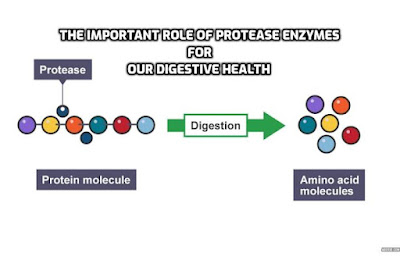Proteolytic enzymes, often referred to as proteases or peptidases, play a crucial role in the intricate process of breaking down proteins into their constituent amino acids.
These enzymes are found throughout the human body and are involved in various physiological processes, including digestion, immune response, and cellular maintenance.
In this post, we will explore the various types of proteolytic enzymes, their functions, and their role in different aspects of our health.
Introduction
Proteolytic enzymes, as the name suggests, are enzymes that break down proteins. They are essential for maintaining overall health and are involved in several critical biological processes.
Types of Proteolytic Enzymes
2.1. Serine Proteases
Serine proteases are a class of enzymes characterized by the presence of a serine residue in their active site. They are involved in processes such as blood clotting and digestion.
2.2. Cysteine Proteases
Cysteine proteases contain a cysteine amino acid at their active site and are found in lysosomes, where they play a crucial role in cellular waste disposal.
2.3. Aspartic Proteases
Aspartic proteases are enzymes with two aspartic acid residues in their active site. They are involved in the digestion of proteins in the stomach.
2.4. Metalloproteases
Metalloproteases require metal ions, such as zinc, for their catalytic activity. They are involved in various physiological processes, including tissue remodeling.
Proteolytic Enzymes in Digestion
3.1. Role of Proteases in the Stomach
Proteases in the stomach, primarily pepsin, break down dietary proteins into smaller peptides. This process is crucial for nutrient absorption.
3.2. Proteases in the Small Intestine
In the small intestine, proteases produced by the pancreas further break down peptides into amino acids, allowing for their absorption into the bloodstream.
Proteolytic Enzymes in Immune Function
4.1. Immune Cells and Proteases
Certain immune cells release proteases to destroy pathogens, aiding in the body’s defense against infections.
4.2. Proteases in Inflammation
Proteases are involved in inflammatory responses, helping to modulate immune reactions and tissue repair.
Proteolytic Enzymes in Tissue Repair
5.1. Wound Healing
Proteolytic enzymes play a crucial role in tissue repair and wound healing by breaking down damaged tissue and facilitating the regeneration of new tissue.
5.2. Scar Tissue Reduction
These enzymes can also help reduce scar tissue formation by promoting the orderly arrangement of collagen fibers.
Regulation of Proteolytic Enzymes
6.1. Enzyme Inhibitors
The body tightly regulates proteolytic enzyme activity through inhibitors to prevent excessive tissue damage.
6.2. Feedback Mechanisms
Feedback mechanisms ensure that protease activity is balanced and responds to the body’s needs.
Diseases Related to Proteolytic Enzyme Dysregulation
7.1. Cystic Fibrosis
In cystic fibrosis, a genetic disorder, defective protease regulation leads to mucus buildup and respiratory issues.
7.2. Rheumatoid Arthritis
Proteolytic enzymes are implicated in the joint inflammation seen in rheumatoid arthritis.
Applications in Medicine
8.1. Enzyme Replacement Therapy
Enzyme replacement therapy is used to treat conditions where the body lacks specific proteases, such as in lysosomal storage disorders.
8.2. Drug Development
Researchers are exploring protease inhibitors as potential treatments for conditions like HIV and cancer.
Proteolytic Enzymes in the Food Industry
9.1. Meat Tenderization
Proteolytic enzymes are used to tenderize meat, improving its texture and flavor.
9.2. Dairy Processing
In the dairy industry, enzymes are employed to coagulate milk proteins and create products like cheese.
Natural Sources of Proteolytic Enzymes
10.1. Pineapple Bromelain
Bromelain, found in pineapples, is a well-known proteolytic enzyme with various health benefits.
10.2. Papaya Papain
Papain, derived from papaya, is another proteolytic enzyme used in traditional medicine and food processing.
Optimizing Enzyme Activity
11.1. Temperature and pH
The activity of proteolytic enzymes is influenced by factors like temperature and pH, and optimizing these conditions is essential for their effectiveness.
11.2. Co-factors
Some proteolytic enzymes require co-factors or coenzymes to function correctly.
Watch this video – How enzymes work
Conclusion
Proteolytic enzymes are versatile and indispensable components of our biology. They contribute to digestion, immunity, tissue repair, and more.




